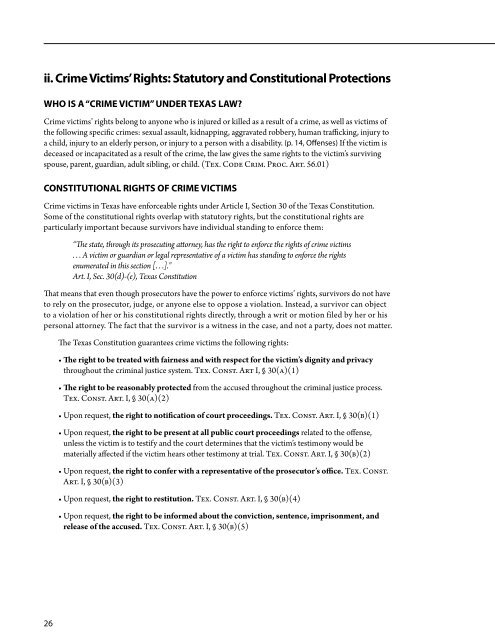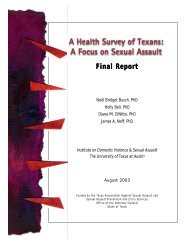Sexual aSSault LEGAL ADVOCACY MANUAL - Texas Association ...
Sexual aSSault LEGAL ADVOCACY MANUAL - Texas Association ...
Sexual aSSault LEGAL ADVOCACY MANUAL - Texas Association ...
You also want an ePaper? Increase the reach of your titles
YUMPU automatically turns print PDFs into web optimized ePapers that Google loves.
ii. Crime Victims’ Rights: Statutory and Constitutional Protections<br />
Who is a “crime victim” under <strong>Texas</strong> law?<br />
Crime victims’ rights belong to anyone who is injured or killed as a result of a crime, as well as victims of<br />
the following specific crimes: sexual assault, kidnapping, aggravated robbery, human trafficking, injury to<br />
a child, injury to an elderly person, or injury to a person with a disability. (p. 14, Offenses) If the victim is<br />
deceased or incapacitated as a result of the crime, the law gives the same rights to the victim’s surviving<br />
spouse, parent, guardian, adult sibling, or child. (Tex. Code Crim. Proc. Art. 56.01)<br />
Constitutional Rights of Crime Victims<br />
Crime victims in <strong>Texas</strong> have enforceable rights under Article I, Section 30 of the <strong>Texas</strong> Constitution.<br />
Some of the constitutional rights overlap with statutory rights, but the constitutional rights are<br />
particularly important because survivors have individual standing to enforce them:<br />
“The state, through its prosecuting attorney, has the right to enforce the rights of crime victims<br />
. . . A victim or guardian or legal representative of a victim has standing to enforce the rights<br />
enumerated in this section [. . .].”<br />
Art. I, Sec. 30(d)-(e), <strong>Texas</strong> Constitution<br />
That means that even though prosecutors have the power to enforce victims’ rights, survivors do not have<br />
to rely on the prosecutor, judge, or anyone else to oppose a violation. Instead, a survivor can object<br />
to a violation of her or his constitutional rights directly, through a writ or motion filed by her or his<br />
personal attorney. The fact that the survivor is a witness in the case, and not a party, does not matter.<br />
The <strong>Texas</strong> Constitution guarantees crime victims the following rights:<br />
• The right to be treated with fairness and with respect for the victim’s dignity and privacy<br />
throughout the criminal justice system. Tex. Const. Art I, § 30(a)(1)<br />
• The right to be reasonably protected from the accused throughout the criminal justice process.<br />
Tex. Const. Art. I, § 30(a)(2)<br />
• Upon request, the right to notification of court proceedings. Tex. Const. Art. I, § 30(b)(1)<br />
• Upon request, the right to be present at all public court proceedings related to the offense,<br />
unless the victim is to testify and the court determines that the victim’s testimony would be<br />
materially affected if the victim hears other testimony at trial. Tex. Const. Art. I, § 30(b)(2)<br />
• Upon request, the right to confer with a representative of the prosecutor’s office. Tex. Const.<br />
Art. I, § 30(b)(3)<br />
• Upon request, the right to restitution. Tex. Const. Art. I, § 30(b)(4)<br />
• Upon request, the right to be informed about the conviction, sentence, imprisonment, and<br />
release of the accused. Tex. Const. Art. I, § 30(b)(5)<br />
26
















